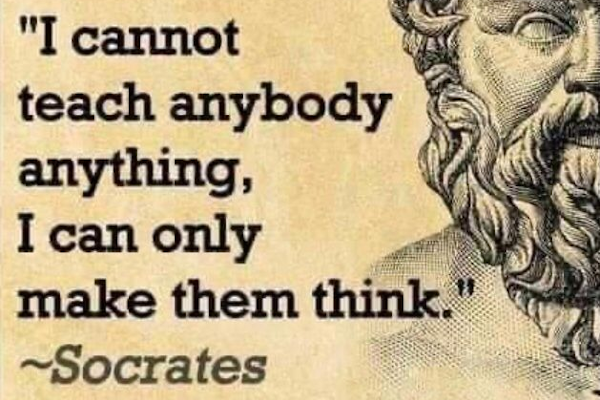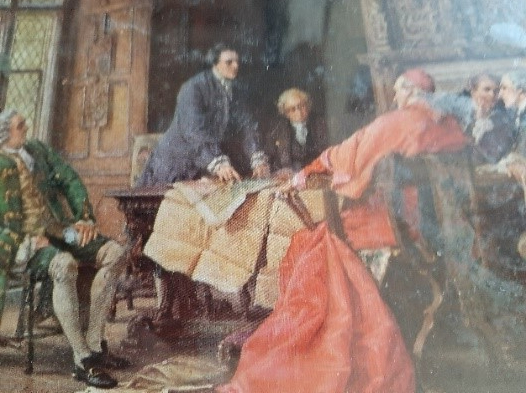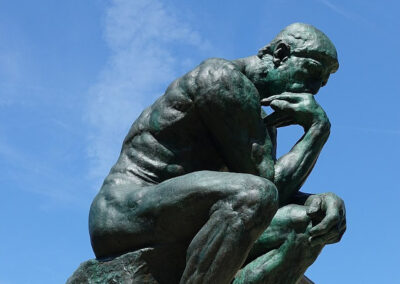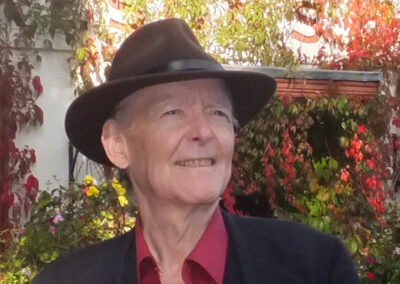Curtain-raiser
It could be a better world for all of us if Reflection was more valued as a norm.
This institute might have attempted Mission Impossible and try to ‘cover the waterfront’ of all the subjects on which reflection per se might give rise but each of them is a bottomless reservoir comprising of hundreds of aspects, thousands of experts and professionals often at odds with one another, and millions of potential contributors. Fascination in it, too, could be endless. This website is envisaged as a place where someone might start their journey into realms worthy of reflection that they hardly realized awaited them; others can see it as a stop-over point along the journey, a place to pick up an extra point or two in areas where they had an interest; perhaps one or two hardy souls might take on board the notion that Reflection merits a capital initial letter, ‘R’, much as has been accorded ‘Meditation’.
Contributions from far and wide are welcomed with open arms though on occasion they may be warily extended.
A ‘non-Mission’ Statement
This VAOM does not seek to duplicate the fine work that is well catered for elsewhere. There are wonderful internet sites about philosophy. This is not one of them. Scientists of dedication and brilliance have their discoveries up in lights. This is not a specialist site in which to pore over them.
A Mission Statement
Ideas about what constitutes meditation and why it is useful have always been around in the West but have not been given the current status of ‘Meditation’ that broadly speaking is of Eastern origins. This disbalance is to be redressed. This platform encourages open-mindedness and respect for the reasonable opinions of others and is one counterweight to an intolerance that of late has seeped into the body politic and much of our lives. Thinking for oneself with care and a reappraisal of ruling ideas are watchwords of this Virtual Agora for Occidental Meditation (VAOM). It is an antidote to our increasingly fast-paced world with its instant modes of communication and the foghorns of stridency that are heard as people champion pet theories. It encourages people to look for improvement in all our lives and understanding in both a practical and a spiritual sense. It is to help consider what we can know. It takes a fresh look at some fundamental ideas, with better life-styles the hoped-for end-result. It encourages the pooling of the sensible ideas and visions of everyman. Deep thought about our place in the universal scheme of things should feed through into how we live our lives. Originality is prized, and an individuality of approach even if conclusions are not new. If there is ‘nothing new under the sun’ it will be a bonus if it can be said of ideas in this site: ‘You heard it here first!’ A person who thinks up ideas for himself is in clover here. Practical Wisdom is a subject of worthwhile study. It can include blending the Yin of contemplative stillness with the Yang of strong creative action.
This institute may be seen as part of a movement, world-wide if patchy in places, of ideas that tend to the betterment of humanity in which such qualities such as consideration for others are a part of the accepted responsibility of governance. If this groundswell eventually permeates upper reaches of power, so much the better for us all. It also goes along with much contemporary advice that uses different terminology for fulfilment in our private lives.
***
A Virtual Agora for Occidental Meditation
An oriental lady on hearing of this virtual Agora for Occidental Meditation exclaimed “Ah! Accidental meditation!” She was too polite to query what might have seemed to her an oxymoron. Reflection is something that we all do and many of us, perhaps that lady, go out of our way to deliberately reflect. We should feel confidence in doing so and this dedicated website should help boost that confidence. It is an updated ‘Agora’, an internet version of a public square in ancient Greece where thinkers of all hues exchanged ideas. It is a jumping-off stage to reflect about life, gathering into one designated space much thought-provoking material from many contexts that bear on our lives and beliefs.
The ‘village pump’ in a Global Village is here, there; and everywhere there are ideas. Some are eye-opening, some mind-bending, some are common sense, some are controversial. Please wander round the stalls that give everyman a chance to showcase his or her wares.
***
I shall be ambitious to have it said of me that I brought philosophy out of the closets and libraries, schools and colleges, to dwell in clubs and assemblies, at tea tables and in coffee houses.
– Joseph Addison
To say that you love wisdom is to say that you value acquiring certain deep insights into certain abstract (and important) questions. One might, if one is lucky, just happen to acquire such insights without much effort. However, if you claim to love wisdom, then you cannot depend on luck to achieve what you value. Doing good philosophy requires you to invest time and effort into figuring out the questions you are interested in. This is likewise true of just about any academic field.
– Anantharaman Muralidharan
Anybody can know. The point is to understand.
– Albert Einstein
***
You who lead busy lives! STOP! (just for a little while). and THINK!
We are the Ancients, standing as we do on the shoulders of the Great of the past. They might feel the pinch of our feet of clay but we see theirs. Plato in outlining ‘three classes of men: lovers of Wisdom, lovers of Honour, and lovers of Gain’ told a truth but not the whole truth. Man has grown up. Honour, on a slow wane since chivalric days, and Gain increasingly tarnished as the glister of mercantilism outweighs the gold, the time surely is now to enthrone on high Practical Wisdom in Plato’s pecking order.
‘Reflection’ of course has been around forever but as a counterweight to our technologically driven, souped-up world, ‘Less haste more speed’ rules! OK’. No exam in Reflection, no university course, exists but it underpins much of what people do. Our Goals are centre stage but not fostering the mental mechanics of scoring them. There is so much that we do not know we do not know, partly as we understand what we understand in ways that that we do not even try to fully understand. An olden style of meditation should be welcomed back to uphold pundits and politicos in lighting up the here-and-now as well as our varied and incompatible conceptions the Hereafter. The active spirits in life do not think that they are sheep walking; their rams gambol ahead of the flock, horns held high, and do not question the solidity of the bedrock beneath their trotters. Action Man is not precluded from deep thinking but it is not his big thing; society’s memes don’t encourage it. There is much that is questionable about societies so best to stand tall on Plato’s plinth and focus on the exact cause of problems before opening the door for bulls to blunder into China shops to ‘fix’ their mirror image.
It may be helpful for people of a reflective disposition to have a designated public space in which to congregate and reflect, where their ideas can be debated rather than lie fallow in minds, like the proverbial desert rose doomed to wither unseen. One’s own slant on the world might have a greater impact than would otherwise be the case. It can contribute to the mulch that becomes a wellspring of ideas. The importance now of personal reflection often is downgraded to something ‘that everybody does and no one thinks much about it’. A centralised corpus of thinking from, and by, Mr Everyman, who at present can turn mainly only to the canon of philosophers, can fortify all of us in the belief that the habit of thinking for its own sake is of value. It sits better now than ever when people feel they are as good as those ‘set above them’. The wish to share thoughts can go untapped by default. Religion, which some feel is a private matter, recognises a community dimension.
The meaningful and the purposive and the practical can go hand in glove. Pensées like that of Anantharaman Muralidharan are starting to crop up with increasing frequency:
‘To say that you love wisdom is to say that you value acquiring certain deep insights into certain abstract (and important) questions. One might, if one is lucky, just happen to acquire such insights without much effort. However, if you claim to love wisdom, then you cannot depend on luck to achieve what you value. Doing good philosophy requires you to invest time and effort into figuring out the questions you are interested in. This is likewise true of just about any academic field.’
In mainstream meditation, people doing ‘their own thing’ are often channelled by gurus or life coaches away from truly independent thinking. Political or academic authorities, define rules, methods and goals. It is a fine thing to soar up to an Empyrean or to find oneself ‘within’ but there are other objectives in cultivating habits of reflection. We are free to choose for ourselves, free to resist insidious innuendos portraying thinking for its’ own sake as a form of brooding or a ‘brown study’. It distracts from a single-minded pursuit of pleasure, fulfilment or mammon. Who knows what insights of value to communities or selfhood may emerge if individuals feel more encouraged and empowered to stand tall on their own ruminations? We are more likely to find our genuine selves as well as worldly success by following our own bent rather than any herd. Too often we are the unwitting victims of splurge. Reflection may tease out otherwise unnoticed nuggets in a democracy of the mind. People may bristle if their pet beliefs are challenged but, ‘Courage, mon brave!’, cleave to objective ideas in your own Ivory Tower. Why knee-jerk to opinions brayed by the ubiquitous Politically Correct, the Know-alls, the egotistical, purblind or the misguided? A still, small voice of common sense can drown out the foghorns.
***
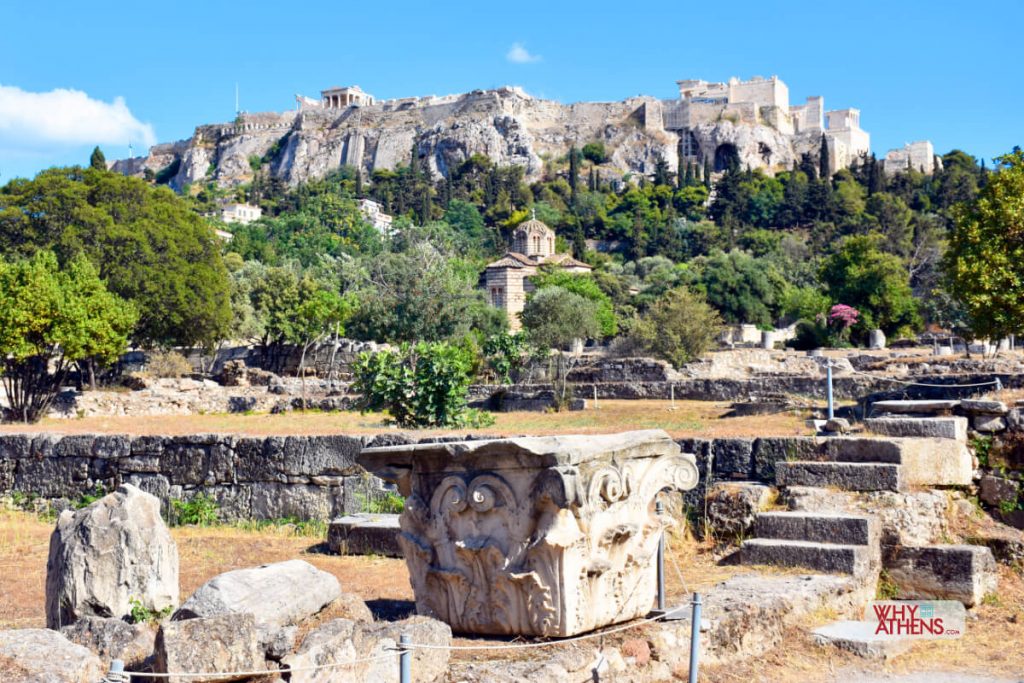
The open plateau of the Ancient Agora provided a place for the citizens of ancient Athens to meet, bond and deliberate on the issues of the day, hence the use of the word “agora”, that derives from the verb “αγείρω” which means to congregate. This ancient city with its court of law, gymnasium, temples and “stoas” has made one of the greatest contributions to humankind, in planting the ideals of citizenship, political consciousness and the foundations of democracy.
The Ancient Agora was a dynamic place, where the great thinkers Sophocles, Socrates, Protagoras, among others, would meet and where ordinary citizens could come and interact with their peers, voice their concerns, agree on solutions and courses of action. It represented the ethos of what most of us in the Western world enjoy today; a sense of freedom, justice, equality and social conscience
.

